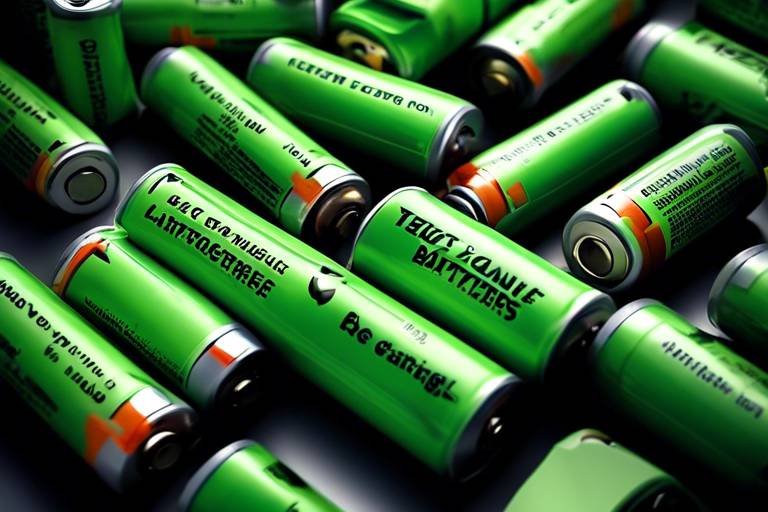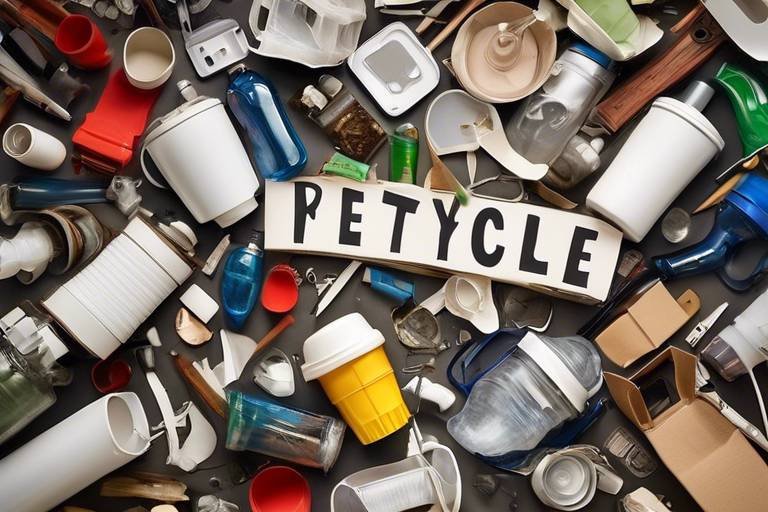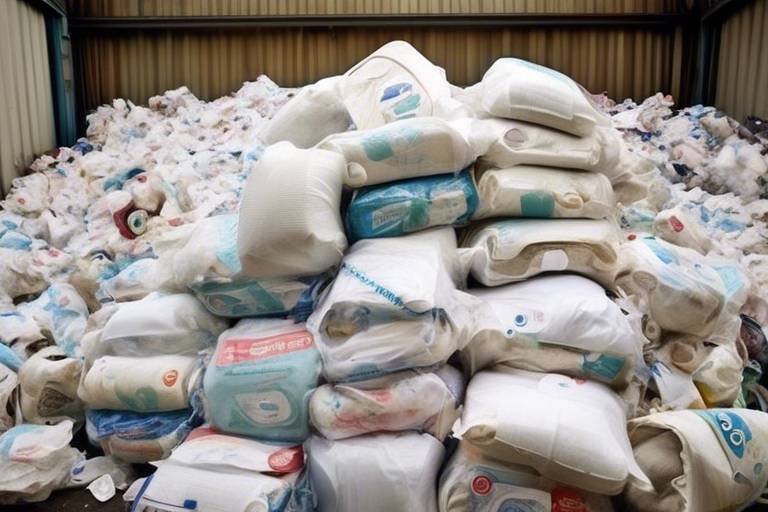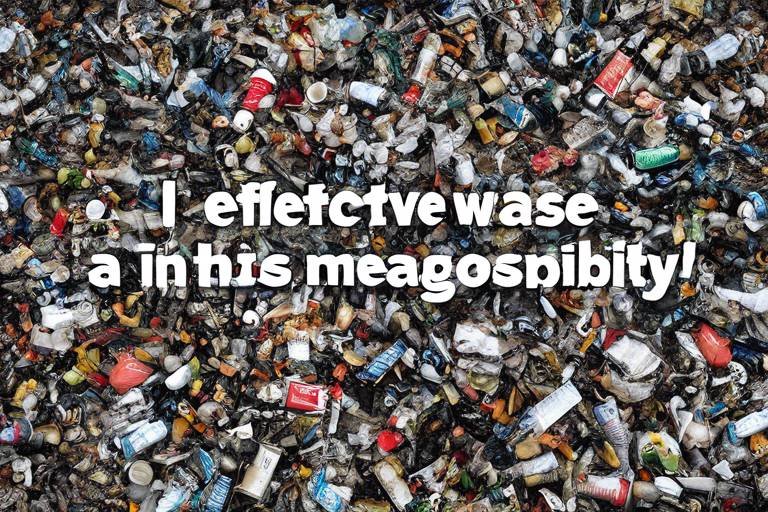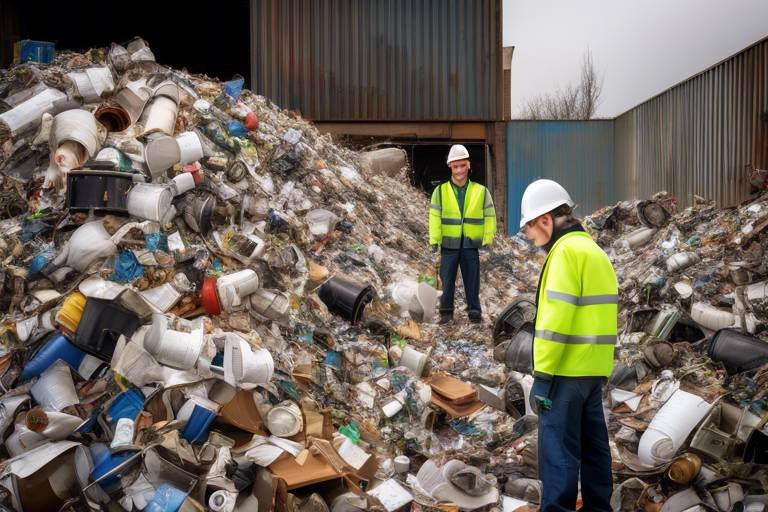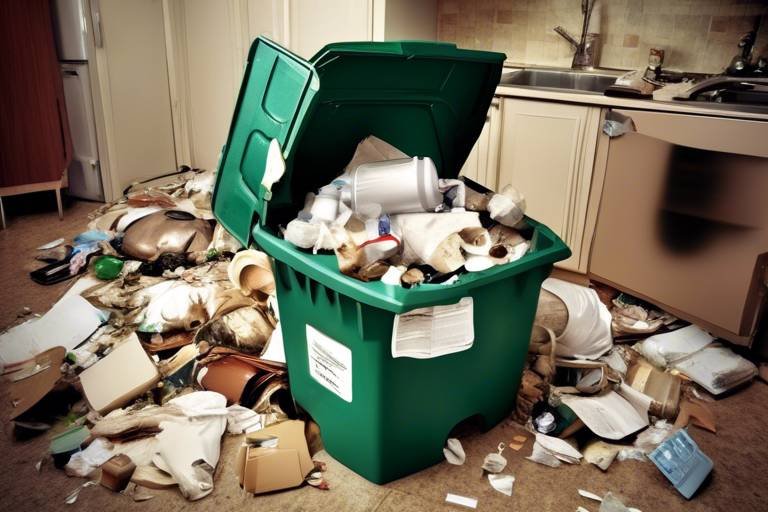How to Encourage Recycling in Universities and Colleges
As we step into a world increasingly aware of environmental issues, it's paramount for universities and colleges to take the lead in promoting sustainability. Higher education institutions are not just places for academic advancement; they are also fertile grounds for cultivating responsible citizens who care about their planet. By implementing effective recycling initiatives, these institutions can significantly reduce waste, conserve resources, and inspire a generation to embrace eco-friendly practices. So, how can we encourage recycling in these vibrant communities? Let’s dive into some impactful strategies!
Before we can rally students and staff behind recycling initiatives, it's essential to highlight why recycling matters. The environmental benefits are staggering! For starters, recycling reduces the amount of waste sent to landfills and conserves valuable natural resources. Think of it this way: every time we recycle, we’re not just reducing trash; we’re giving materials a second life. This process also saves energy, which is crucial in our fight against climate change. Economically, recycling can lead to job creation and cost savings for universities. By making recycling a priority, campuses can significantly contribute to a sustainable future while instilling a sense of responsibility in their communities.
Awareness is the first step toward action. Universities need to engage their communities through effective campaigns that inform students about recycling practices. This can take many forms, from workshops to vibrant social media campaigns. Imagine walking through campus and seeing eye-catching posters that not only explain what can be recycled but also share success stories of how the university has made a difference. These campaigns should be designed to educate and inspire, showing students that their participation matters.
Social media is a powerful tool in the hands of today's students. Platforms like Instagram and Twitter can be leveraged to create engaging content that promotes recycling initiatives. For instance, universities can share tips on recycling correctly, highlight upcoming events, or showcase student-led projects that have had a positive impact. By creating a buzz online, institutions can reach a wider audience and encourage students to take part in recycling efforts.
One of the most effective ways to amplify recycling initiatives is to collaborate with student organizations. These groups often have established networks and can mobilize their peers more effectively than administration alone. By partnering with clubs and societies, universities can organize events like recycling drives, competitions, or eco-friendly fairs. This not only fosters a sense of community but also injects a little fun into the recycling process. Who wouldn’t want to compete for the title of “Most Eco-Friendly Dorm?”
Hands-on experiences can be incredibly impactful. Hosting educational workshops allows students to learn proper recycling techniques and understand the benefits of reducing waste. Imagine a workshop where students can bring in items from home to learn about recycling and upcycling them into something new. This not only teaches valuable skills but also reinforces the importance of sustainability in everyday life.
Having the right infrastructure is crucial for any recycling program. Universities should ensure that recycling bins are strategically placed around campus, clearly labeled, and easy to access. Regular collection schedules are also essential to keep the bins from overflowing. To illustrate, consider a scenario where students are walking to class and see a recycling bin right next to a trash can. If the recycling bin is well-marked and convenient, they are much more likely to recycle their bottles and papers instead of tossing them in the trash.
Sometimes, a little motivation goes a long way. Incentives can be a fantastic way to encourage students to engage in recycling. This could be through competitions, prizes, or even recognition programs. For example, universities might establish a “Recycling Champion” award that recognizes students or groups who demonstrate exceptional commitment to recycling. Not only does this promote friendly competition, but it also highlights the importance of sustainable practices.
Competitions can create excitement and camaraderie around recycling initiatives. By organizing friendly contests between dorms or departments, universities can foster a spirit of rivalry that encourages students to participate actively in recycling programs. Imagine the thrill of seeing which dorm can collect the most recyclables in a month, complete with a celebratory event for the winners!
Recognition is a powerful motivator. Celebrating individuals and groups who contribute significantly to recycling efforts can inspire others to follow suit. Universities can host awards ceremonies or feature standout eco-warriors in newsletters and on social media. This not only acknowledges their hard work but also promotes a culture of sustainability that resonates throughout the campus.
- What materials can be recycled on campus? Most campuses accept paper, cardboard, plastics, and metals. It's essential to check with your university's recycling guidelines for specifics.
- How can I get involved in recycling initiatives? Look for student organizations focused on sustainability, participate in workshops, and engage in campus events that promote recycling.
- Are there any rewards for recycling? Many universities have incentive programs that offer prizes or recognition for students who actively participate in recycling efforts.

Understanding the Importance of Recycling
Recycling is not just a buzzword; it's a vital practice that can lead to significant environmental and economic benefits, especially in universities and colleges. Imagine a world where waste is minimized, resources are conserved, and the planet is healthier for future generations. This is the world that effective recycling initiatives can help create. By recycling, universities can reduce the amount of waste sent to landfills, conserve valuable natural resources, and lower their carbon footprint. When students and staff understand these benefits, they are more likely to engage in recycling efforts, making it a collective responsibility.
One of the most compelling reasons to promote recycling in higher education institutions is its impact on waste reduction. In the United States alone, millions of tons of waste are generated each year, much of which could be recycled. By implementing robust recycling programs, universities can drastically cut down on the waste they produce. For example, a single university can divert thousands of pounds of paper, plastic, and metal from landfills annually. This not only helps the environment but also saves the institution money on waste disposal costs.
Furthermore, recycling helps conserve natural resources. When materials such as paper, glass, and aluminum are recycled, it reduces the need for new raw materials. This means fewer trees are cut down, less water is used, and less energy is consumed in the manufacturing process. To put it into perspective, recycling one ton of paper can save approximately 17 trees, 7,000 gallons of water, and 4,100 kilowatts of electricity. These statistics highlight the direct impact that recycling can have on our planet's health.
In addition to environmental benefits, recycling can also have economic advantages. By reducing waste and conserving resources, universities can lower their operational costs. This financial saving can be redirected towards educational programs, student services, or campus improvements. Moreover, engaging in recycling initiatives can enhance a university's reputation as a sustainable institution, attracting environmentally conscious students and faculty.
Ultimately, the key to successful recycling programs in universities lies in student engagement. When students are informed about the positive outcomes of recycling, they are more likely to participate actively. This can be achieved through various methods, such as workshops, awareness campaigns, and community involvement. The more students understand the importance of recycling, the more likely they are to take action, creating a ripple effect that encourages others to do the same.
In summary, understanding the importance of recycling is crucial for fostering a sustainable campus environment. By recognizing its environmental and economic benefits, universities can motivate their communities to participate actively in recycling initiatives. This not only contributes to a healthier planet but also cultivates a culture of sustainability that can inspire future generations.

Creating Awareness Campaigns
Creating awareness campaigns is a pivotal step in fostering a culture of recycling within universities and colleges. These campaigns serve as the bridge between knowledge and action, igniting a spark of interest among students and staff alike. To truly resonate with the campus community, it’s essential to employ a variety of methods that cater to different learning styles and preferences. After all, not everyone absorbs information the same way, right? So, let’s dive into some effective strategies that can make recycling initiatives not just informative but also engaging and fun!
One powerful way to educate students about recycling practices is through workshops. These hands-on sessions can demystify the recycling process, showing students exactly what can be recycled and how to do it correctly. Imagine a workshop where students can bring in their recyclables and learn the ropes while connecting with peers! This interactive approach not only educates but also builds a sense of community. Workshops can also include demonstrations on how to reduce waste effectively, making them a comprehensive learning experience.
In addition to workshops, social media has become an indispensable tool in spreading awareness. Platforms like Instagram and Twitter can be leveraged to share eye-catching graphics, quick tips, and success stories from fellow students who are making a difference. For instance, a series of posts showcasing “Recycling Champions” on campus can inspire others to join the movement. Social media campaigns can also highlight upcoming recycling events, creating buzz and anticipation among students. Think about it—who doesn’t love a good Instagram story that’s both informative and visually appealing?
Another effective method is the use of posters strategically placed around campus. These visual reminders can serve as constant nudges to recycle. A well-designed poster with bold colors and engaging graphics can catch the eye and convey the recycling message quickly. To maximize impact, consider including statistics that highlight the benefits of recycling—like how much waste can be reduced or how many resources can be saved. For example:
| Recycling Impact | Before Recycling | After Recycling |
|---|---|---|
| Waste Reduction | 100 tons | 30 tons |
| Resource Conservation | 50% more resources used | 20% resources saved |
Moreover, collaborating with student organizations can amplify the reach of these campaigns. Partnering with clubs and societies allows for a broader audience and can lead to more dynamic events. Imagine a “Recycling Week” organized by multiple student groups, featuring a mix of competitions, workshops, and awareness activities. This not only fosters a spirit of teamwork but also encourages students to take ownership of their campus’s sustainability efforts.
Finally, it’s crucial to measure the effectiveness of these awareness campaigns. Gathering feedback through surveys can provide insights into what strategies are resonating with students and which areas need improvement. After all, feedback is the breakfast of champions! By continuously refining these campaigns based on student input, universities can ensure that their recycling initiatives remain relevant and impactful.
In summary, creating awareness campaigns in universities and colleges involves a multi-faceted approach that combines education, engagement, and community involvement. By utilizing workshops, social media, eye-catching posters, and collaboration with student organizations, institutions can cultivate a vibrant recycling culture that not only benefits the environment but also enriches the campus community. So, are you ready to roll up your sleeves and start making a difference?
- How can I get involved in recycling initiatives on campus? Check with your university’s sustainability office or student organizations to find out about upcoming events and volunteer opportunities.
- What materials can typically be recycled on campus? Most campuses accept paper, cardboard, plastics, and metals, but it's best to check local guidelines for specifics.
- How can I promote recycling among my friends? Share information and resources on social media, organize group recycling events, or simply lead by example!

Utilizing Social Media Platforms
In today's digital age, social media platforms serve as a powerful tool for engaging students and promoting recycling initiatives on college campuses. Imagine scrolling through your Instagram feed and coming across a vibrant post showcasing a recent recycling event, complete with eye-catching graphics and inspiring testimonials from your peers. This is the kind of content that not only grabs attention but also sparks interest in sustainable practices. By harnessing the visual appeal of platforms like Instagram, Twitter, and Facebook, universities can effectively spread the word about their recycling programs and encourage participation.
One effective strategy is to create a dedicated social media account focused solely on sustainability and recycling efforts. This account can share tips on how to recycle correctly, highlight success stories from the campus community, and announce upcoming recycling events. Engaging content such as videos, infographics, and interactive polls can make recycling feel less like a chore and more like a community effort. For instance, posting a fun video tutorial on how to properly sort recyclables can demystify the process and encourage students to get involved.
Furthermore, utilizing hashtags can help in reaching a broader audience. By creating a unique hashtag for your recycling campaign, students can share their own experiences and efforts, fostering a sense of community and collective responsibility. For example, a hashtag like #RecycleRally2023 could encourage students to post photos of their recycling efforts, creating a visual representation of the campus's commitment to sustainability.
Engaging with students through comments and direct messages can also enhance participation. Responding to questions, sharing additional resources, or simply thanking students for their efforts can build a supportive online community. By encouraging students to share their own recycling stories, universities can tap into the power of peer influence—after all, seeing a friend actively participating in recycling can motivate others to join in.
Moreover, consider running social media campaigns that highlight specific recycling challenges or events. For instance, a month-long challenge where students compete to see who can recycle the most can create excitement and a sense of urgency. Participants can post their progress using the campaign hashtag, and universities can feature the top recyclers on their official pages, giving them recognition and encouraging others to participate.
In conclusion, leveraging social media platforms is a dynamic way to promote recycling initiatives within universities. By creating engaging content, fostering community involvement, and encouraging friendly competition, universities can significantly boost student participation in recycling programs. So, why not take advantage of the platforms that students are already using? With a little creativity and strategic planning, social media can transform recycling into an exciting and engaging campus-wide effort.
Q: How can I get involved in recycling initiatives on campus?
A: Check your university's social media pages for upcoming events and challenges. You can also reach out to student organizations focused on sustainability to find out how you can contribute.
Q: What types of materials can I recycle?
A: Most campuses accept paper, cardboard, plastics, and metals. Be sure to check the specific guidelines provided by your university to ensure proper recycling practices.
Q: How does social media help in promoting recycling?
A: Social media allows for quick dissemination of information, encourages community engagement, and creates a platform for sharing success stories and tips, making recycling more accessible and appealing to students.

Engaging Student Organizations
Engaging student organizations is a powerful way to amplify recycling efforts on university campuses. These groups are often at the heart of campus life, bringing together students who share common interests and passions. By tapping into their enthusiasm and networks, universities can create a ripple effect that encourages more students to participate in recycling initiatives. Think of student organizations as the catalysts for change; when they rally around a cause, their collective energy can spark widespread action.
One effective approach is to collaborate with various clubs and societies, such as environmental groups, academic departments, and even social organizations. For instance, partnering with an environmental club can lead to the organization of events like campus clean-up days or recycling drives. These events not only raise awareness but also create a sense of community and shared purpose among participants. When students see their peers actively engaging in recycling, they are more likely to join in. It’s all about creating that peer influence that makes recycling the norm rather than the exception.
Moreover, universities can leverage the competitive spirit inherent in many student organizations. By hosting friendly competitions between different groups, such as dorms or academic departments, schools can foster a sense of rivalry that motivates students to recycle more. For example, a challenge could be set where the organization that recycles the most over a month wins a pizza party or a small grant for their next event. This not only incentivizes participation but also makes recycling fun and engaging.
Additionally, it’s essential to provide student organizations with the tools and resources they need to succeed. Offering workshops on how to effectively promote recycling, along with providing them with recycling bins and informational materials, can empower these groups to take ownership of recycling initiatives. When organizations feel equipped and supported, they are more likely to take the lead in organizing events and spreading the word about the importance of recycling.
In conclusion, engaging student organizations is a dynamic strategy for promoting recycling on campus. By fostering collaboration, encouraging friendly competition, and providing essential resources, universities can create a vibrant culture of sustainability that resonates with students. When students see their peers championing recycling, it transforms the initiative into a community effort, making it not just a responsibility but a shared value that everyone can be proud of.

Hosting Educational Workshops
Hosting educational workshops on recycling is one of the most impactful ways to engage students and foster a culture of sustainability on campus. Imagine a room filled with eager students, all learning together about the importance of recycling and how they can make a difference. These workshops can provide hands-on experiences that not only educate but also inspire action.
To kick things off, universities can collaborate with local environmental organizations or sustainability experts to lead these workshops. This collaboration not only brings in knowledgeable speakers but also connects students to the larger community. During these sessions, students can learn about proper recycling techniques, the types of materials that can be recycled, and the environmental impact of their efforts. For instance, a workshop could include a segment on how recycling one ton of paper can save 17 trees, 7,000 gallons of water, and reduce greenhouse gas emissions. Isn't that a powerful statistic?
Additionally, it’s crucial to make these workshops interactive. Instead of just lecturing, facilitators can incorporate activities such as:
- Sorting Games: Have students sort recyclable materials from trash to see firsthand what can and cannot be recycled.
- DIY Projects: Teach students how to repurpose items that would typically end up in the landfill, like turning old t-shirts into reusable bags.
- Group Discussions: Encourage students to share their thoughts on recycling and brainstorm innovative solutions to common challenges.
Moreover, promoting these workshops through various channels, such as social media, campus newsletters, and flyers, can significantly boost attendance. Creating a buzz around these events can transform them into must-attend occasions. Think of it as throwing a party, but instead of cake and balloons, you have knowledge and empowerment!
To ensure the workshops are effective, collecting feedback from participants is essential. This can be done through surveys or informal discussions at the end of each session. Understanding what resonated with students and what could be improved will help refine future workshops, making them even more engaging and informative.
In conclusion, hosting educational workshops not only equips students with the necessary knowledge to recycle effectively but also builds a community of environmentally conscious individuals. By making learning fun and interactive, universities can significantly enhance student participation in recycling initiatives, paving the way for a more sustainable future.
Q: How can I get involved in organizing a recycling workshop?
A: You can reach out to your university's sustainability office or local environmental organizations to collaborate on planning a workshop.
Q: What topics should be covered in a recycling workshop?
A: Topics can include proper recycling techniques, the benefits of recycling, waste reduction strategies, and DIY repurposing projects.
Q: How can I promote the workshop to ensure good attendance?
A: Utilize social media, campus newsletters, and word-of-mouth to create excitement. Consider offering incentives, like refreshments or giveaways, to attract more participants.

Implementing Effective Recycling Infrastructure
When it comes to encouraging recycling on university campuses, having the right infrastructure in place is absolutely essential. Imagine trying to build a house without a solid foundation; it just wouldn't work, right? Similarly, without strategically placed recycling bins and clear signage, even the most enthusiastic students might struggle to participate in recycling initiatives. Therefore, universities need to prioritize developing an efficient recycling infrastructure that makes it easy and intuitive for everyone to join in.
First and foremost, it's crucial to ensure that recycling bins are located in high-traffic areas. Think about places where students gather, such as dining halls, libraries, and common areas. By placing recycling bins in these locations, you catch the attention of students when they’re most likely to dispose of waste. Moreover, each recycling bin should be clearly labeled with visual aids that indicate what can and cannot be recycled. This can include images of common recyclable items like plastic bottles, aluminum cans, and paper products. A well-designed label can serve as a quick reference guide, reducing confusion and mistakes.
Additionally, regular collection schedules are vital. If bins overflow, it creates a negative perception of the recycling program. Students may feel that recycling is pointless if it appears neglected. To combat this, universities should establish a routine for emptying recycling bins, ensuring they are always clean and ready for use. A well-maintained recycling program not only encourages participation but also reflects the institution's commitment to sustainability.
Furthermore, it's beneficial to integrate recycling stations with other waste disposal options. For instance, placing trash, compost, and recycling bins side by side can create a one-stop disposal area, making it easier for students to make the right choice. This setup can be likened to a buffet where all the options are laid out in front of you; the easier it is to see your choices, the more likely you are to pick what’s best for the environment.
Lastly, universities should consider conducting regular assessments of their recycling infrastructure. Are the bins being used correctly? Are they in optimal locations? Gathering feedback from students and staff can provide valuable insights into how to improve the system. This could be done through surveys or informal discussions, allowing the campus community to voice their opinions and suggestions. By continually refining the recycling infrastructure based on user feedback, universities can foster a culture of sustainability that evolves with the needs of their students.
- Why is recycling infrastructure important in universities?
Effective recycling infrastructure simplifies the recycling process, making it more accessible and encouraging higher participation rates among students and staff. - What should be included in recycling signage?
Signage should include clear images of recyclable items, instructions on how to recycle properly, and information on what happens to the materials after they are collected. - How can universities assess the effectiveness of their recycling programs?
Regular surveys, feedback sessions, and monitoring bin usage can help universities understand how well their recycling initiatives are working and where improvements are needed.

Incentivizing Participation
Incentives can play a pivotal role in motivating students to engage actively in recycling efforts on campus. When students see tangible rewards for their actions, it not only boosts participation but also fosters a sense of community and responsibility towards the environment. Think about it: who doesn’t love a little friendly competition or the thrill of winning a prize? By implementing various reward systems, universities can create an exciting atmosphere that encourages consistent recycling habits among the campus community.
One effective method to incentivize participation is through competitions. Imagine a challenge where dorms or departments compete to see who can recycle the most over a month. Not only does this spark a sense of rivalry, but it also gets everyone involved in a fun and engaging way. Schools can track the amount of recyclable material collected and announce winners at the end of the competition. To add to the excitement, prizes could range from gift cards to local businesses, free meals at the campus dining hall, or even eco-friendly merchandise. This not only rewards the winners but also promotes local businesses and sustainability.
In addition to competitions, recognizing eco-friendly practices can significantly inspire others to join in. Universities can establish recognition programs that highlight individuals or groups who make significant contributions to recycling efforts. For instance, a “Recycler of the Month” award could be introduced, showcasing students who actively promote recycling in their dorms or organizations. This recognition can be celebrated through social media shout-outs, newsletters, or even a dedicated bulletin board in common areas. By publicly acknowledging these efforts, you create role models that others can look up to, thereby fostering a culture of sustainability on campus.
Furthermore, universities can implement a point system where students earn points for recycling, which can be redeemed for various rewards. This system could be integrated into campus apps, making it easy for students to track their contributions. For example, students might earn:
| Action | Points Earned |
|---|---|
| Recycling a bag of plastic bottles | 10 points |
| Participating in a recycling workshop | 15 points |
| Organizing a recycling event | 25 points |
| Sharing recycling tips on social media | 5 points |
As students accumulate points, they can unlock various rewards, such as discounts at campus stores, tickets to events, or even exclusive access to workshops. This gamification of recycling not only makes it fun but also encourages ongoing participation. When students feel that their efforts are recognized and rewarded, they are more likely to develop lasting habits that contribute to a sustainable campus environment.
In conclusion, incentivizing participation in recycling programs is essential for creating a culture of sustainability at universities. By introducing competitions, recognition programs, and point systems, institutions can engage students in a fun and meaningful way. When students feel valued for their contributions, they are more likely to continue their efforts, leading to a cleaner and greener campus for everyone.
- How can we ensure that students are aware of the incentives available? Regular communication through emails, social media, and campus newsletters can help keep students informed about the latest competitions and rewards.
- What types of prizes are most appealing to students? Prizes that offer experiences, such as event tickets or gift cards to popular local eateries, tend to resonate well with students.
- How can we measure the success of our recycling incentive programs? Tracking participation rates, the volume of materials recycled, and student feedback can provide valuable insights into the effectiveness of the programs.

Establishing Competitions
When it comes to encouraging recycling on campus, sometimes a little friendly competition can work wonders! Establishing competitions among dorms, departments, or even student organizations can create a buzz that motivates everyone to get involved. Imagine the excitement as students rally together, all aiming for that coveted title of "Top Recycling Champions!" Not only does this foster a sense of community, but it also instills a spirit of sustainability that can last beyond the competition.
To kick off a recycling competition, universities can set specific goals and guidelines. For instance, teams can be challenged to collect the most recyclable materials over a month, or they could compete to see who can reduce their waste the most effectively. Setting clear criteria helps ensure that everyone understands what they are working towards and makes it easier to measure success. Additionally, universities can provide resources such as recycling bins and educational materials to help participants understand what can and cannot be recycled.
What makes these competitions even more exciting is the opportunity for prizes and recognition. Prizes can range from eco-friendly merchandise to gift cards, or even a pizza party for the winning team. This not only rewards participants for their efforts but also encourages others to join in the fun. As students see their peers actively participating and winning, they might feel inspired to jump on the recycling bandwagon themselves. It's all about creating a culture where recycling is not just a chore but a community effort filled with enthusiasm and camaraderie.
Furthermore, universities can enhance the competition by incorporating social media. Imagine students posting their recycling efforts, sharing tips, and celebrating their victories online! This not only spreads awareness but also creates a digital footprint that can inspire even more students to get involved. By showcasing the competition on platforms like Instagram and Twitter, universities can reach a broader audience and keep the momentum going throughout the event.
In conclusion, establishing competitions around recycling initiatives can transform the way students engage with sustainability on campus. By fostering excitement and community involvement, universities can not only boost recycling rates but also cultivate a long-lasting culture of eco-friendliness. So, what are you waiting for? Let the recycling games begin!
- How can we ensure fair competition? Setting clear rules and guidelines from the beginning will help maintain fairness. Regular updates on each team's progress can also keep everyone informed.
- What types of prizes work best? Eco-friendly prizes, such as reusable bags or water bottles, tend to resonate well with students. Gift cards to local businesses or a fun group activity can also be enticing!
- How can we promote the competition effectively? Utilize social media platforms, campus newsletters, and posters around campus to spread the word. Engaging graphics and catchy slogans can grab attention and encourage participation.

Recognizing Eco-Friendly Practices
In the quest for a greener campus, is not just a nice-to-have; it's a vital piece of the puzzle. When universities highlight the efforts of individuals and groups who actively engage in recycling and sustainability, it creates a ripple effect that inspires others to join in. Imagine walking through campus and seeing a bulletin board adorned with photos and stories of students who have made significant contributions to the recycling initiative. This simple act of recognition can turn the spotlight on sustainability and make it a celebrated aspect of campus life.
One effective method to acknowledge these eco-warriors is through awards and recognition programs. Universities can establish annual awards for the most innovative recycling projects, the highest recycling rates among dorms, or even the best sustainability initiatives led by student organizations. Such recognition not only boosts morale but also fosters a sense of community among students who are passionate about making a difference.
Additionally, hosting eco-friendly events can serve as a platform for recognizing these practices. For instance, during Earth Week, schools can organize a ceremony to honor those who have gone above and beyond in their recycling efforts. This can be complemented by a showcase of projects that students have implemented, allowing them to share their ideas and inspire their peers. Imagine a vibrant event where students can walk around and engage with displays that highlight innovative recycling methods, all while celebrating their fellow classmates' contributions.
Moreover, social media plays a pivotal role in spreading the word about these eco-friendly practices. Universities can create dedicated hashtags or social media campaigns that spotlight individuals or groups making a difference. For example, a weekly feature on Instagram could highlight a "Sustainability Star" who has shown exceptional commitment to recycling. This not only recognizes their efforts but also encourages others to follow suit, creating a culture of sustainability that permeates the campus.
In conclusion, recognizing eco-friendly practices is essential for cultivating a sustainable campus environment. By celebrating the efforts of individuals and groups, universities can create a positive feedback loop that encourages more students to engage in recycling initiatives. The key is to make recognition visible and meaningful, ensuring that everyone understands the impact they can have on their community and the planet.
- Why is it important to recognize eco-friendly practices?
Recognizing eco-friendly practices motivates others to participate, fosters a culture of sustainability, and acknowledges the hard work of individuals and groups committed to making a difference. - What are some ways universities can recognize eco-friendly practices?
Universities can implement awards, host eco-friendly events, and leverage social media to highlight the efforts of students and organizations involved in sustainability initiatives. - How can recognition impact student engagement in recycling?
When students see their peers being recognized for their efforts, it creates a sense of community and encourages them to participate in recycling initiatives, knowing their contributions can also be celebrated.
Frequently Asked Questions
- Why is recycling important in universities?
Recycling in universities is crucial because it helps reduce waste, conserves natural resources, and promotes a sustainable future. By participating in recycling initiatives, students and staff can significantly lower their environmental impact and contribute to a cleaner campus and community.
- How can I get involved in recycling efforts on campus?
Getting involved is easy! You can start by joining student organizations focused on sustainability, participating in recycling events, or simply spreading awareness among your peers. Additionally, attending workshops and engaging in competitions can make recycling fun and impactful.
- What types of materials can be recycled at my university?
Most universities accept common recyclable materials such as paper, cardboard, glass, and certain plastics. However, it's essential to check your campus's recycling guidelines, as they may vary. Always look for clearly labeled recycling bins to ensure you're recycling correctly!
- Are there any incentives for recycling on campus?
Absolutely! Many universities offer incentives like competitions, prizes, and recognition programs for those who actively participate in recycling efforts. These initiatives not only motivate students but also foster a sense of community and friendly rivalry.
- How can social media help promote recycling initiatives?
Social media is a powerful tool for spreading awareness about recycling. Universities can use platforms like Instagram and Twitter to share tips, success stories, and upcoming recycling events, engaging students and encouraging them to participate in sustainability efforts.
- What can I do if I notice recycling bins are not available?
If you find that recycling bins are lacking on campus, consider bringing it to the attention of your university's administration. You can also advocate for better recycling infrastructure by collaborating with student organizations to push for more accessible recycling options.
- How do educational workshops help with recycling?
Educational workshops provide hands-on learning experiences that teach students about proper recycling techniques and the benefits of recycling. These sessions can empower individuals to make informed decisions about waste reduction and encourage a culture of sustainability on campus.



